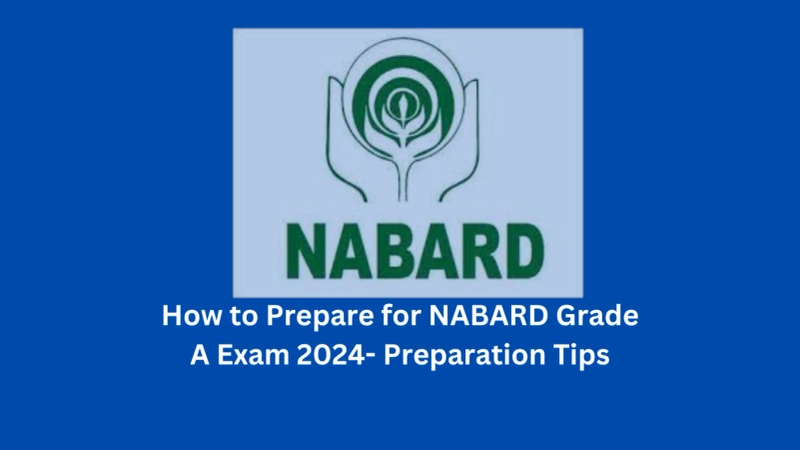Preparing for the NABARD Grade A exam requires systematic planning and thorough understanding of the exam pattern, syllabus, and preparation strategies. This guide aims to provide a step-by-step approach to help you navigate through the preparation process effectively.
Understanding the NABARD Grade A Exam
NABARD (National Bank for Agriculture and Rural Development) conducts the Grade A exam to recruit officers in various departments such as Rural Development Banking Service (RDBS), Protocol and Security Service, and more. The exam is highly competitive and requires comprehensive preparation across multiple subjects.
Step 1: Know the Exam Syllabus and Pattern
The first step in your preparation journey is to familiarize yourself with the exam syllabus and pattern. The NABARD Grade A exam consists of two phases:
Preliminary Exam: This phase comprises multiple-choice questions (MCQs) from subjects like English Language, Quantitative Aptitude, Reasoning Ability, General Awareness, Computer Knowledge, and Economic and Social Issues (ESI) or Agriculture and Rural Development (ARD).
Main Exam: It includes both objective and descriptive types of questions. The objective part covers ESI or ARD, while the descriptive part tests your writing skills on economic and social issues.
Step 2: Create a Study Plan
Once you have a clear understanding of the syllabus, devise a study plan that suits your schedule and allows ample time for each subject. Divide your study hours wisely among different topics and allocate extra time for subjects you find challenging.
Step 3: Gather Study Material
Collect comprehensive study material for each subject of the exam. Reliable sources include standard textbooks, reference books, current affairs magazines, and online resources. Make sure to choose materials that cover the entire syllabus and are updated with recent developments.
Step 4: Focus on Subject-wise Preparation
English Language:
Improve grammar, vocabulary, and comprehension skills.
Practice reading comprehension, cloze test, and error detection exercises regularly.
Quantitative Aptitude:
Strengthen your basics in arithmetic, algebra, geometry, and data interpretation.
Solve a variety of numerical problems and practice time management during calculations.
Reasoning Ability:
Practice logical reasoning, puzzles, seating arrangement, and syllogism questions.
Enhance your problem-solving ability and speed through regular practice.
General Awareness:
Stay updated with current affairs related to agriculture, rural development, banking, and socio-economic issues.
Read newspapers, follow news channels, and refer to annual yearbooks for comprehensive coverage.
Computer Knowledge:
Focus on topics such as basic computer operations, MS Office, internet, and computer security.
Practice online quizzes and simulate exam-like conditions for better preparation.
Economic and Social Issues (ESI) or Agriculture and Rural Development (ARD):
Understand fundamental concepts related to economics, agriculture, rural development programs, and government schemes.
Analyze recent trends and their impact on the economy and rural sectors.
Step 5: Practice Mock Tests and Previous Year Papers
Regular practice of mock tests and previous year papers is crucial for exam preparation. It helps in understanding the exam pattern, improving time management skills, and identifying weak areas for further improvement. Analyze your performance after each test to gauge your progress.
Step 6: Work on Descriptive Writing Skills
For the descriptive part of the main exam, practice writing essays on economic and social issues. Focus on clarity, coherence, and logical presentation of ideas. Develop a habit of outlining your essays before writing to organize your thoughts effectively.
Step 7: Revision and Time Management
Allocate sufficient time for revision as it consolidates your learning and helps in retaining information for a longer duration. Create short notes or mind maps for quick revision of key concepts. Manage your time efficiently during the exam by practicing under timed conditions.
Step 8: Stay Motivated and Stay Healthy
Exam preparation can be challenging, so maintain a positive attitude and stay motivated throughout the journey. Take breaks, exercise regularly, and maintain a healthy diet to keep your mind and body in optimal condition.
Conclusion
Preparing for the NABARD Grade A exam requires dedication, perseverance, and a well-structured study plan. By following these steps systematically and practicing consistently, you can enhance your chances of succeeding in this competitive exam. Remember to stay focused, stay updated with current affairs, and believe in your abilities as you work towards achieving your goal.


